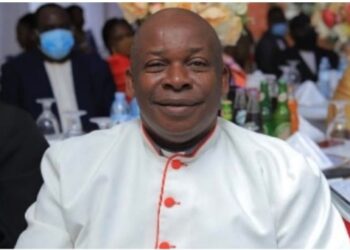– A recent commentary by Charles James Senkubuge, a towering figure in Uganda’s theatre, arts, and media industries and now a senior manager at Salt Media Group where he also hosts a popular morning show, on Salt TV, has brought attention to Sheikh Prince Kassim Nakibinge’s reference to Microfinance Minister Haruna Kasolo as “Caesar’s minister” during the Kibuli prayers on July 31, 2025. This remark, made during the joyous celebration of Kabaka Ronald Mutebi’s 32 years on the throne—where Kasolo represented the central government—has sparked some unnecessary tension in political circles without clear justification. Some have misinterpreted it as a slight against the minister and President Yoweri Museveni. However, a thoughtful examination suggests that Senkubuge and his audience may have overlooked the intended context, and this misreading of Nakibinge’s speech could potentially strain relations between the Buganda Kingdom, Muslim leadership, and the central government. As of 04:38 PM EAT today, let us explore this matter through biblical and contextual lenses to promote harmony and address recent developments, while honoring all perspectives involved.
Biblical Context of “Render unto Caesar”
The phrase “Render unto Caesar what is Caesar’s, and unto God what is God’s” (Matthew 22:21) stems from Jesus’ insightful response to a question about Roman taxes. When shown a coin bearing Caesar’s image, Jesus thoughtfully distinguished between earthly responsibilities—such as taxes and civic duties—and divine devotion, represented by spiritual allegiance. Far from an insult, this teaching acknowledges Caesar’s authority over material governance while affirming God’s ultimate sovereignty. Renowned Christian scholars, including Jacques Ellul, view it as a balanced approach, encouraging cooperation with secular powers where it aligns with higher principles, fostering peace rather than division.
Prince Nakibinge’s Contextual Intent
Sheikh Prince Kassim Nakibinge, a respected Buganda royal and advisor to Kabaka Mutebi, likely employed this biblical imagery with deliberate care. With Minister Kasolo present as a representative of the central government, Nakibinge’s “Caesar’s minister” comment may have been a thoughtful nod to Kasolo’s role within the state’s administrative sphere—akin to Caesar’s domain—while the prayer event honored the Kabaka and God’s spiritual authority. This reflects Nakibinge’s diplomatic wisdom, bolstered by his MBA, PhD, and long-standing efforts to unite cultural and religious communities, suggesting a gesture of respect rather than disrespect toward the government or its emissary.
Charles James Senkubuge’s Perspective and Reflection
Charles James Senkubuge, a luminary in Uganda’s theatre, arts, and media landscape, and a senior manager at Salt Media Group where he hosts a popular morning show, offered his thoughts on Salt TV. With a rich background that includes starring roles in acclaimed productions like *Akakomo* and his past candidacy for Kampala Lord Mayor, Senkubuge’s commentary may have sought to engage his audience with a lighthearted perspective, suggesting the remark could be interpreted as a challenge to Kasolo and Museveni. However, this view appears to arise from a literal or politically influenced reading that may not fully reflect the historical harmony between Buganda’s monarchy and central governance. While his platform fosters vibrant discussion, a deeper consideration of context could enrich his valuable contribution, especially given his influential role in media and community leadership.
Minister Kasolo’s Response and Vision for Unity
Notably, Minister Haruna Kasolo, the subject of the remark, has shown no indication of offense. Had it been intended as an insult, Kasolo might have responded directly. Instead, he delivered an inspiring nation-building speech at Kibuli, framing the restoration of the Buganda Kingdom—celebrated on this occasion—as a moment for reflection. Kasolo aimed to remind today’s commentators that the government of President Museveni restored kingdoms, particularly the Buganda Kingdom, in 1993, a landmark event in Uganda’s history. He highlighted how President Museveni and Kabaka Muwenda Mutebi II have navigated stages of rebuilding the state, fostering a coexistence that unites Uganda today. Kasolo emphasized that this period is one of gratitude to God for the wisdom of leaders in both the central government and the Buganda Kingdom, noting that Uganda is more united now than ever before. This response reflects Kasolo’s diplomatic grace, consistent with his role as Microfinance Minister, and suggests Nakibinge’s comment was a contextual acknowledgment of his governmental role rather than a criticism.
Promoting Harmony
Far from creating conflict, Nakibinge’s words invite a spirit of cooperation: Kasolo’s presence reflects “Caesar’s” domain, while the Kabaka’s celebration uplifts a spiritual narrative, echoing Jesus’ call for balanced loyalty.
Senkubuge’s commentary, when viewed alongside Kasolo’s unifying message, presents an opportunity for constructive dialogue. Drawing on his esteemed position as a cultural icon and media leader, Senkubuge can play a pivotal role in fostering understanding, helping to prevent any unintended rift and strengthening unity among Uganda’s diverse leadership structures. This moment underscores the importance of thoughtful interpretation to nurture peace in political circles.
….
Mike Ssegawa is a veteran journalist and deputy RDC Kassanda District.
Do you have a story in your community or an opinion to share with us: Email us at editorial@watchdoguganda.com













